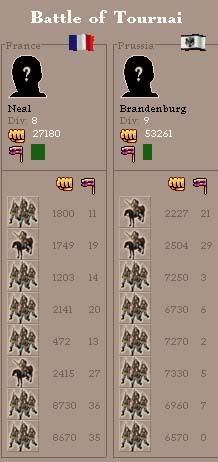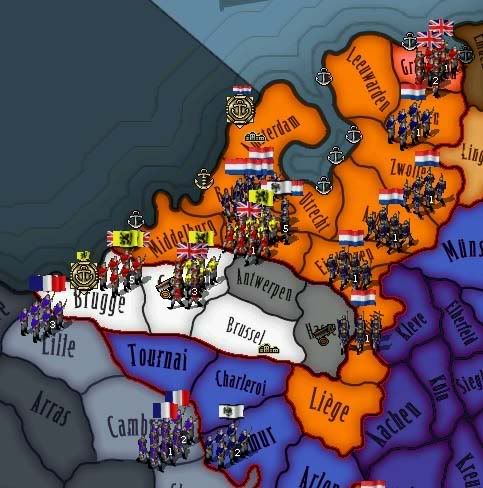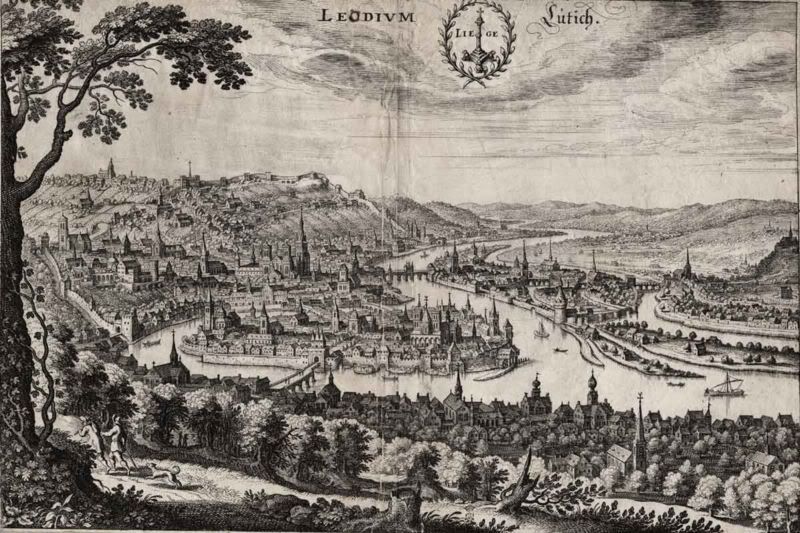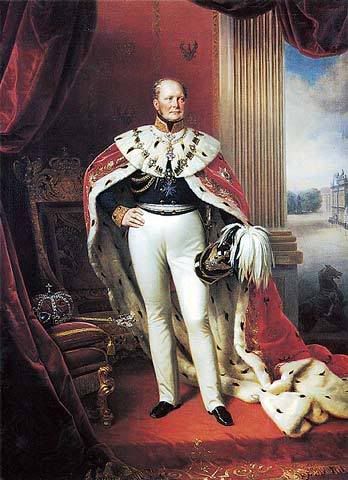The main thing is to make history, not to write it - A Prussian AAR
- Thread starter unmerged(35351)
- Start date
-
We have updated our Community Code of Conduct. Please read through the new rules for the forum that are an integral part of Paradox Interactive’s User Agreement.
You are using an out of date browser. It may not display this or other websites correctly.
You should upgrade or use an alternative browser.
You should upgrade or use an alternative browser.
beautiful what you did to the Belgians there. I hope we can all learn to treat the Belgians badly.
joebthegreat said:beautiful what you did to the Belgians there. I hope we can all learn to treat the Belgians badly.
Hey now....
Great start wannabe...
Now you mentioned something about 90 French divisions vs 75 Prussians
Let me get this straight. You are at war with the French and Belgians right? But the Dutch aren't?
Wenis I'm not entirely sure yet, but it will remain Prussian for the duration of the war. Also it has good RGO's and a steel factory.
Duke of Wellington Indeed, and it will certainly help me in future wars.
soonerborn0524 Indeed, and unlikely this will be the only one.
joebthegreat Beautiful? Mweh, could have done better. As it is now, my ally has lost Arlon (now Prussian) and Breda (!) to the Belgians.
Quirinus308 If you (or the AI for that matter) can manage that in 1838 I'm truly impressed. Walter Model is right, 90,000 French troops against 75,000 Prussian troops[/B]
Wenis Yes, and Britain. Unfortunately the Dutch peaced out early, so now Belgium remains intact, well Flanders.
Walter Model Indeed, doesn't look good, now does it.
Duke of Wellington Indeed, and it will certainly help me in future wars.
soonerborn0524 Indeed, and unlikely this will be the only one.
joebthegreat Beautiful? Mweh, could have done better. As it is now, my ally has lost Arlon (now Prussian) and Breda (!) to the Belgians.
Quirinus308 If you (or the AI for that matter) can manage that in 1838 I'm truly impressed. Walter Model is right, 90,000 French troops against 75,000 Prussian troops[/B]
Wenis Yes, and Britain. Unfortunately the Dutch peaced out early, so now Belgium remains intact, well Flanders.
Walter Model Indeed, doesn't look good, now does it.
Starting this as early as you did, I'm curious to see how Prussia does... France was alot more powerful, relatively, back then. Partly because Prussia's industry hadn't been very well developed yet.
Rensslaer
Rensslaer
In my games ,if Prussia enters an early war with France , they would usually get massacred and would be forced to surrender much of Rhineland .
In fact , in one of my games , France declared war on the whole German alliance fairly early on . Initially , Bavaria's staggering reserves were forcing the France back across the Siene , taking Paris . Once they peace out .... Prussia was decimated . In the end , several German minors were annexed and part of Rhineland was taken .
In fact , in one of my games , France declared war on the whole German alliance fairly early on . Initially , Bavaria's staggering reserves were forcing the France back across the Siene , taking Paris . Once they peace out .... Prussia was decimated . In the end , several German minors were annexed and part of Rhineland was taken .
Part IV: Fighting France and Britain
With Belgium out of the war, Prussia found herself at war against France and Britain. Immediately after the attempt to siege Lille the French launched a counter attack on Tournai, with 90,000 troops. The two armies met at the outskirts of Tournai on the 26th of December. The odds initially favoured the French, but after one month of manoeuvring and sporadic attacks by the Prussians, they inflicted mediocre losses upon the French and made the odds favour them.

Battle of Tournai
This procedure took nearly 4 months, before the armies met at Mouscron, a village about 20 kilometres from Tournai. By now the Prussians had called upon reinforcements and outnumbered the French 2 to 1. The battle lasted for a few days, before the French withdrew to Cambrai. This was the time for the Prussian to use their long border against the French. When French troops had appeared near Tournai, the Prussians launched a counter offensive against the city of Metz. By the time the Battle of Tournai had ended, Metz was firmly in Prussian hands. During the next stage nearly 100,000 Prussian crossed the border and marched towards Lille and Camrbrai. Short battles occurred in the vicinity of the cities, but the French were unable to push the Prussian forces back.
Just as Lille and Cambrai were falling to the advancing Prussian army, the French started to express their desire for peace. Although Prussia was able to continue the war, it would take a huge toll, as already the economy was strained by the war effort. Under economic pressure, the Prussian state offered favourable terms to France and on the 20th of May, 1838, hostilities between France and Prussia ended.
The only thing remaining was Britain, which had, since the start of the war, been harassing the Dutch. The occupation of the harbour of Rotterdam was a blow to the economy of the Dutch, and so Prussian troops marched towards Rotterdam. Nearly 50,000 British troops found themselves encircled when a force of nearly 70,000 Prussian and Dutch troops engaged British positions. Despite initial successes of the British, they were slowly being pushed back to the coast, and on the 9th of September, the remaining 14,500 British troops surrendered. With Rotterdam once again under Dutch control, peace talks between Britain, the Netherlands and Prussia commenced. The British initially wanted to take the Dutch colony of Surinam, but due to the recent losses the stood no chance on actually gaining them.
The London Treaty was revised and now acknowledged Prussian ownership over Wallonia, while the Dutch would gain Breda back from the Belgians. The British further had to concede that Belgium was dead, and that the Flemish successor state would become a Dutch satellite state.

The Lowlands after the Belgian Conflict has ended
Could you change Flanders' colour to Yellow (like Montenegro), would be better, because White is just plain ugly for them.
It's in Country.csv btw (edit with notepad)
It's in Country.csv btw (edit with notepad)
KuzuX What is with all this talk about war? There are more ways to acquire Luik, and even if I get it people will complain that Luxembourg will look ugly. I want to have Líege, and most likely I'll, but how? That I don't know.
Dionysios II Flandern is good as it is. Personally I don't like that yellow, so it remains white. Besides, I'm confident they'll be gone in the next 50 years.
Duke of Wellington Indeed, very favourable. Wallonia is a decent place to have, it has a steel factory and valuable RGOs. Furthermore it will shorten my way to Paris, so the French might better build some good roads to make the marching easier for my soldiers
Dionysios II Flandern is good as it is. Personally I don't like that yellow, so it remains white. Besides, I'm confident they'll be gone in the next 50 years.
Duke of Wellington Indeed, very favourable. Wallonia is a decent place to have, it has a steel factory and valuable RGOs. Furthermore it will shorten my way to Paris, so the French might better build some good roads to make the marching easier for my soldiers
Part V: The Recovery from the Belgian conflict
To say that Prussia was devastated by the war is an overstatement, but Prussia did suffer from the war. From all parties involved in the Belgian conflict Prussia had emerged as the victor and gained Wallonia, with her iron and coal deposits. Furthermore the war had strengthened her position as a great power, while the French and British lost only troops, their goal of creating a buffer state had failed. The war also caused a steep decline in Austrian-Prussian relations, while the exact cause remains unknown, many speculate that Austria’s inability to sent troops to the theatre of war was the cause of this decline.
An armed uprising took place in the Dutch city of Líege on the 10th of October 1838. The Dutch were unable to suppress the revolt and called for Prussian help to recapture the city. The rebels stood no chance against the well-trained Prussian forces, and by the 13th of October the city of Líege was in Prussian hands. Prussia, to the surprise of the Dutch, annexed the city into Wallonia. To appease the Dutch for the loss of Líege the Prussians sent several officers to the Dutch and launch military reforms in the Dutch Armed Forces.

View of Líege
Prussia started to lick it’s wounds as the economy was growing, existing industries were expanded and new railroads were constructed throughout the Eastern part of the country. By 1841 the Prussian railway network had connected Köningsberg to Berlin. But it wasn’t only the economy which was rapidly increasing, the military, one of Prussia’s main strengths, increased as well. The mobilization plans were revised and now the Prussian Military Staff could call upon 200,000 reserve troops instead of a mere 160,000. Not only the reserve troops were expanded, the professional army saw an increase of 8 divisions, totalling 96,000 men.
When Austria declared war upon Krakow in mid 1839, it was time for the Prussians to cut off all diplomatic ties with the Austrians. Frederick Wilhelm III found Austria an unreliable and weak partner and preferred to have a strong ally. Secretly the King had already increased the diplomatic ties between Russia and Prussia, hoping that an alliance between the two would bring peace and prosperity to Central Europe. The news of the collapse of the Prussian-Austrian alliance, shook the German Confederation. Many southern states held the opinion that Prussia’s aggressive stand was the cause of a rupture between Austria and Prussia, while the northern states, excluding Hanover which was still part of the British Empire, blamed the Austrians for being incapable of helping their allies when needed.

Frederick Wilhelm IV, the new King of Prussia
Slowly the German Confederation started her decline, as neither Austria or Prussia seemed willing to set aside their differences. Frederick Wilhelm III started a second military expansion, as his troops in Silesia and Brandenburg where few and sporadic spread. By the end of his rule war was looming once again for Prussia and Austria. With the ascension of Frederick Wilhelm IV to the Prussian throne, many hoped he would calm the relations between Prussia and Austria.
I suggest steadily giving away the belgian provinces to The Netherlands in return for some money, like about 50000 a province (handled through events)
How does Belgium become Flanders? Is that a VIP event, or one you've created? Because I can't find any event for Belgium getting defeated and becoming anything else in vanilla Vicky.
So is this war over Belgium going to be considered the First World War? And btw, great twist, with war erupting right in the beginning of the game. I will certainly follow this one as I loved your OE AAR.
I hope he doesn't calm relations. Now would be a good time to go for the Austrians and really deal decent blow to their empire. BTW what does RGO stand or?
Dionysius Thank you for joining in!
Walter Model Wallonia is rich in RGO's and factories, and there live a few north germans in Líege and Arlon. We can't accept that they live under Walloon rulership.
Ayn Mandarb It's not an event. I changed it through the save file, as there is no point in calling it Belgium if it only consists of Flandern.
chefportnen I'm not sure, as the only theatre of war was Belgium and the Rheinland, but it involved 4 European great powers.
Duke of Wellington RGO stands for Resource Gathering Operation, IIRC. A war against Austria would be nice, but what will I demand. I've to watch out for my BB or France might seek revenge.
Walter Model Wallonia is rich in RGO's and factories, and there live a few north germans in Líege and Arlon. We can't accept that they live under Walloon rulership.
Ayn Mandarb It's not an event. I changed it through the save file, as there is no point in calling it Belgium if it only consists of Flandern.
chefportnen I'm not sure, as the only theatre of war was Belgium and the Rheinland, but it involved 4 European great powers.
Duke of Wellington RGO stands for Resource Gathering Operation, IIRC. A war against Austria would be nice, but what will I demand. I've to watch out for my BB or France might seek revenge.

